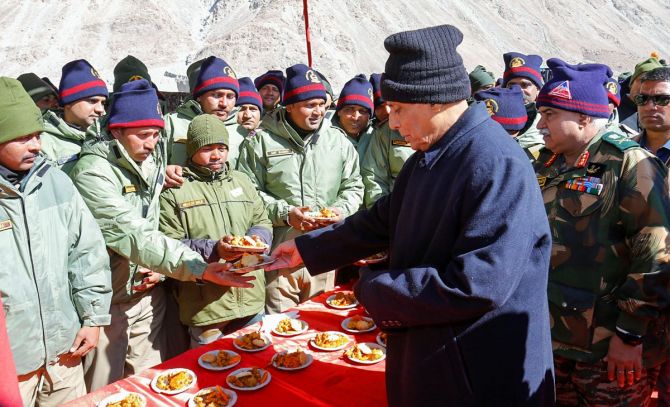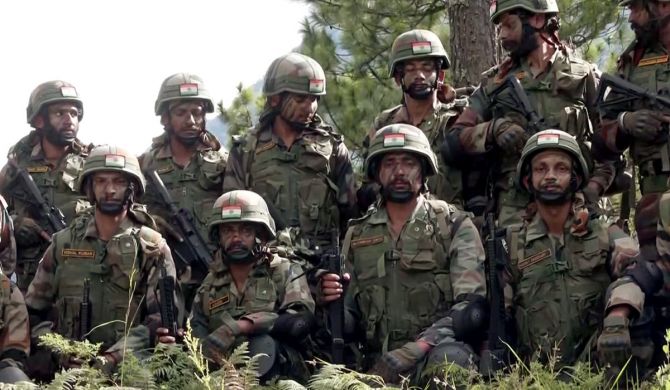'We must understand that the LAC is a political issue for China, so any action on the LAC will keep India focussed on the LAC which gives China the opportunity for any adventurism in the Indian Ocean.'

"Xi Jinping needs a politico-military victory. The LAC provides that opportunity," says Lieutenant General P R Shankar (retired) former director general of artillery and professor, aerospace department, IIT-Madras.
"The 3,500 km-long LAC gives China enough space to execute salami slicing and put pressure on the LAC repeatedly," the general tells Rediff.com's Archana Masih in the concluding part of his interview.
What are some of the unique challenges on the LAC in Arunachal Pradesh that are different from what soldiers encounter on the LAC in Ladakh?
In Ladakh the LAC is far more nebulous and includes a vast area. There is no cover and the area is relatively flat.
In Arunachal, the ridgelines are very steep. The passes are few and soldiers have to occupy those ridgelines.
Any area above 13,000-14,000 feet is a tough one. Apart from the terrain factor, the mental makeup of the troops deployed in Arunachal or Ladakh is the same.
On the Chinese side, the approach to the LAC is better. Their road comes closer to the LAC. Whereas due to the terrain difficulty on our side our troops have to climb for an hour or so on a verticle incline from where the road ends to reach the pickets.
What is the main strategic importance of the Arunachal frontier?
Any place along the LAC is strategic in nature. There is a large geostrategy and geopolitics involved. Any success that China gets on the LAC is a geopolitical victory.
We must understand that in China, the LAC is a political issue; not a military issue. So any salami slicing of the LAC or any incident, is a political victory for Xi Jinping who will do anything to rev up nationalism; he knows he cannot do the same against Taiwan.
Personally, politically and geopolitically for Xi Jinping and his cohorts, the LAC is a priority. This is where he gets results and where he can pump up nationalism.
It gives the PLA a huge fillip because it boosts confidence and sends a message to the larger audience that they can teach India a lesson.
It also promotes the next step towards Taiwan because they can use the fear factor to convey that if they can do something against India, does Taiwan stand a chance?
With Taiwan, there's no defence required, but against India, they have to be both offensive and defensive. Hence, geopolitically and strategically, the LAC is far more integral to China.

In terms of the Chinese design and intent, do you think they will try and open another frontier in Uttarakhand?
Any place on the 3,500 kilometres is open. We must understand that the LAC is a political issue for China, so any action on the LAC will keep India focussed on the LAC which gives China the opportunity for any adventurism in the Indian Ocean.
Hence, the LAC is very critical.
Strategically, we in India have to change our mindset -- if we are going to be defensive on the LAC it will become a pressure point wherein we will keep investing in our defences at the cost of our navy and maritime capability building.
If we convert part of our effort into offensive capability, it will put the PLA on the defensive. The moment they do that, we can maintain a balance at our end and give adequate attention to the maritime domain.
India as a rising power has to expand its maritime capability and capacity. We can't fall prey to the Chinese strategy on the LAC.

Is the Chinese attempt to tie down India on the LAC like Pakistan has on the LoC?
China does not operate that way. Firstly, I don't think China has the capability to do so because of the simple reason that they do not have that experience. Our fundamental strength is that all our units have operated on the LAC and LoC. Most of our infantry units have served on the Siachen Glacier and have wealth of operational experience.
If they get involved with incidents of regular firing on the LAC, then the cost will go up for China as well. Moreover, their army is predominantly Han who travel 5,000-6,000 kilometres to defend hostile territory.
I don't think China wants to get into that. It's not in their DNA and it might be too much of a risk for them politically.
I want to reiterate that it doesn't make sense to view China militarily. The LAC has to be handled politically. The mentality of all Indians is to treat the LAC as a military problem while China treats it as a political problem. So there's a difference. We need to make that switch.

When did the Chinese aggressive posture begin in this century? After Xi's accession?
You're right. In 2003 during Atal Bihari Vajpayee's time, we signed the agreement with China where we recognised Tibet as part of China and they recognised Sikkim as part of India.
At that time, the issue of South Tibet didn't exist and we had border agreements to maintain peace on LAC.
If you see the graphs, the incidents have just shot up after Xi Jinping became president. Before that, there were hardly any incursions or aggression. We recognised that they had a right to patrol up to their line of perception of the LAC and they also recognised that we had the right to control up to our perception of the LAC.
It was mutually agreed, conducted and adhered to. But the problems really started after Xi Jinping took over.
Xi wants to be one of the tallest leaders in China. And for that, he needs a politico-military victory.
The LAC provides that opportunity and Xi has recognised it long back. It also gives him the means to cut his peer competitors down.
The two countries that Xi fears the most are the USA and India -- both democracies and huge military powers. Both these countries are inimical to him. Xi knows he cannot defeat the USA easily, but feels he could have a chance against India.
However, even against India, he doesn't have a great chance in an all-out war because both are nuclear countries, but he has enough space to execute salami slicing and put pressure on the LAC repeatedly.
The greater comprehensive national power of China allows him the flexibility to do so.
Feature Presentation: Aslam Hunani/Rediff.com











 © 2025
© 2025